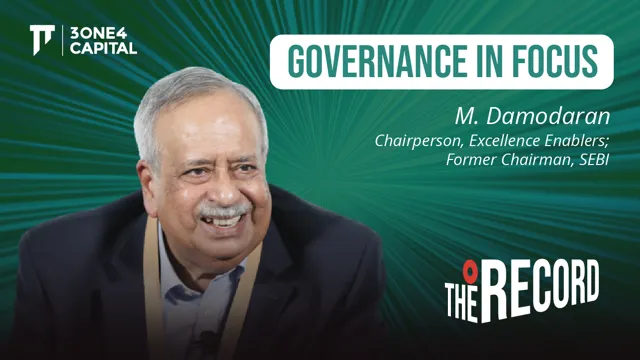
3one4 Capital Launches Season 2 of The Record
Building on the success of its inaugural season with N. R. Narayana Murthy and Mohandas Pai, The Record returns to explore the world of industry leaders, entrepreneurs, and changemakers, offering unparalleled insights into their journeys and the strategies that fuel their generational success.
We had the pleasure of hosting M Damodaran (Chairperson, Excellence Enablers Private Limited) for an exclusive, closed-door conversation. The former Chairman of SEBI lays out the intricate interplay between innovation and governance to unveil a narrative that resonates far beyond boardrooms – one that shapes the very trajectory of India's business landscape, influencing both emerging startups and established enterprises.
The episode also critiques the "move fast and break things" approach, advocating for a more reflective and sustainable growth model and stressing that growth without governance is ultimately untenable.
Below is a recap of the noteworthy highlights and takeaways from the conversations we had:
In the intricate realm of corporate governance, it is vital to differentiate between compliance and governance. While compliance adheres to external mandates, governance drives strategic decisions rooted in the conviction of ethical values, long-term sustainability, and responsible decision-making. To illustrate, imagine a chess game where compliance is represented by the black pieces and governance by moving the white pieces. Compliance is responding to a regulator's moves, while governance involves making strategic decisions based on what is right.
The principles of corporate governance can be traced back through history, even to our ancient texts. Notably, Mahatma Gandhi proclaimed businessmen to be trustees and emphasised that the ends do not justify the means.
“Corporate governance is doing the right things, at the right time, in the right manner, and for the right reasons.” - M Damodaran, Chairperson, Excellence Enablers
While corporate governance is not the sole factor in driving business success, it is indispensable. Successful businesses need more than governance – products, markets, and other elements are vital. However, for companies to stand the test of time, robust governance forms the underlying thread, regardless of their industry, operations, or market presence.
Addressing a predicament faced by both investors and portfolio companies, it was mentioned that governance encompasses not only adhering to compliance or regulatory norms, but also embodies strategic decisions and ethical considerations that drive the entity's longevity and prosperity. The message is clear: authentic governance is the compass guiding businesses beyond immediate gains, aligning decisions with enduring success.

Governance boils down to two core issues: conflict of interest and asymmetry of information. Information asymmetry impacts power dynamics and must be reduced, while conflict of interest must be eliminated entirely. Boardrooms often struggle with these, necessitating a focus on unbiased decision-making. The boardroom composition should prioritise independence and diversity of thought, transcending conventional definitions. Robust governance calls for a commitment to integrity and a culture of constructive tension between the Board and the management.
In the pursuit of growth, foundational processes often take a back seat, underscoring the need for sustainable governance. Regulation should focus on effective implementation, rather than excessive prescriptions. The clamor for more regulations is rarely the solution. Rather, the focus should be on refining existing regulations. A regulatory review authority could serve as a valuable mechanism, ensuring that only relevant regulations remain in force. The essence lies in realising the value of regulations and engaging constructively with legislators to address pressing concerns. It is necessary for the regulated entities to collectively engage with the regulators so that regulations are pragmatic and not needlessly prescriptive.
Crafting effective regulations is a complex process, as witnessed in the journey of AIFs and the venture capital ecosystem. Sometimes, regulations intend to protect investors, yet the very entities they protect are not the ones that need external intervention to protect their interests. Whether registration should be considered in place of regulation is not a choice that has universal application. There are instances to demonstrate that regulation, with consequences for non-compliance is necessary, especially when systemic issues are being addressed.
At its core, the role of the Board is to champion the best interests of the company, transcending individual agendas. A well-aligned Board is expected to constructively challenge management proposals. The key is to express disagreement, without becoming disagreeable. Differing perspectives fine-tune choices. Leaders must cultivate a culture where courage and intellectual honesty thrive.
Addressing unspoken concerns is essential. Factors like power dynamics or personality can hinder discussions but voicing different opinions ensures that critical issues are not ignored. It is about maintaining a relentless focus on the company's well-being, even if personal interests diverge.

.jpeg)












